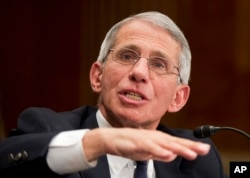A vaccine against the Zika virus could be ready for initial human trials within months and be dispatched to affected regions for large-scale testing in 2017, a top U.S. infectious-disease official said Thursday.
“We know we can start early trials,” Dr. Anthony Fauci, director of the National Institute of Allergy and Infectious Diseases, told a Senate panel. "By the end of 2016, a trial will have been completed that will ask: Is it safe and does it induce a response [from the immune system] that you would predict would be protective [against Zika]?”
The World Health Organization announced Friday in Geneva that large-scale trials of a Zika virus vaccine are at least 18 months away.
A WHO spokeswoman told reporters that the agency is "proceeding very quickly" on a vaccine, with some 15 groups or companies involved in the research.
She also said the WHO believes it could confirm suspected links between the virus and two neurological conditions within a few weeks.
Fauci expressed guarded confidence in a Zika vaccine being developed in U.S. government laboratories, noting that the work mirrors previous efforts to stop other mosquito-borne viruses, West Nile and dengue.
After initial safety trials, determining the vaccine’s effectiveness would be the next step.
“Probably within a period of six to eight months, you will be able to definitively say whether it works,” Fauci said. “Then you could ask for an accelerated approval from the FDA [Food and Drug Administration].”
Fauci testified before a Senate Appropriations subcommittee that is considering President Barack Obama’s request for $1.8 billion in emergency funding to combat the Zika virus. The pathogen is spreading rapidly in tropical regions and is thought to be associated with a devastating birth defect.
Limiting infections
In addition to speeding vaccine development, funds would go to more immediate steps to contain the virus and limit infections, particularly in pregnant women.
“A vaccine isn’t going to be here for some time,” said Thomas Frieden, director of the Centers for Disease Control and Prevention. “Right now, what we need to do as well as we can is to reduce mosquito populations and reduce the risk to pregnant women.”
Of particular concern are U.S. territories in the Caribbean, like Puerto Rico, and other tropical zones.
“We’re most concerned about Puerto Rico,” Frieden said. “At some point, we may well have tens or hundreds of thousands of Zika infections in Puerto Rico. There are approximately 34,000 births per year in Puerto Rico, and so we are concerned with 3,000 births per month, roughly.”
Growing public concerns about Zika appear to be swaying some of Capitol Hill’s fiscally conservative lawmakers who normally seek to pare funding requests from the administration.
“We have received [a request for] $1.8 billion in funding to enhance Zika virus programs,” said the committee’s chairman, Republican Senator Thad Cochran of Mississippi. “Is this enough? Are we in need of an additional request?”
Frieden and Fauci said the sum requested constituted their best estimate of what is required to combat Zika. Until funds are approved, Fauci said, the National Institutes of Health is shifting resources from other research projects into the new Zika initiative.
Frieden warned against diverting funds appropriated to fight Ebola, despite the fact that the deadly virus appears to be contained in West Africa at present.
“Ebola isn’t over,” he said. “Those dollars are fully committed.”
Marissa Melton contributed to this story





